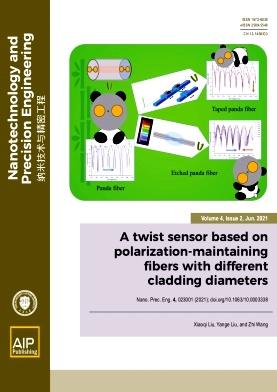Manipulations of micro/nanoparticles using gigahertz acoustic streaming tweezers
IF 2.7
3区 工程技术
Q2 MATERIALS SCIENCE, MULTIDISCIPLINARY
Nami Jishu yu Jingmi Gongcheng/Nanotechnology and Precision Engineering
Pub Date : 2022-06-01
DOI:10.1063/10.0009954
引用次数: 16
Abstract
Contactless acoustic manipulation of micro/nanoscale particles has attracted considerable attention owing to its near independence of the physical and chemical properties of the targets, making it universally applicable to almost all biological systems. Thin-film bulk acoustic wave (BAW) resonators operating at gigahertz (GHz) frequencies have been demonstrated to generate localized high-speed microvortices through acoustic streaming effects. Benefitting from the strong drag forces of the high-speed vortices, BAW-enabled GHz acoustic streaming tweezers (AST) have been applied to the trapping and enrichment of particles ranging in size from micrometers to less than 100 nm. However, the behavior of particles in such 3D microvortex systems is still largely unknown. In this work, the particle behavior (trapping, enrichment, and separation) in GHz AST is studied by theoretical analyses, 3D simulations, and microparticle tracking experiments. It is found that the particle motion in the vortices is determined mainly by the balance between the acoustic streaming drag force and the acoustic radiation force. This work can provide basic design principles for AST-based lab-on-a-chip systems for a variety of applications.使用千兆赫声波流镊子操纵微/纳米颗粒
微/纳米颗粒的非接触式声学操纵由于其几乎不依赖于目标的物理和化学性质而引起了广泛的关注,使其普遍适用于几乎所有的生物系统。工作在千兆赫(GHz)频率的薄膜体声波(BAW)谐振器已经被证明可以通过声流效应产生局部高速微涡。得益于高速涡旋的强大阻力,baw支持的GHz声流镊(AST)已被应用于捕获和富集从微米到小于100纳米的颗粒。然而,粒子在这种三维微涡系统中的行为在很大程度上仍然是未知的。本文通过理论分析、三维模拟和微粒跟踪实验,研究了GHz AST中的粒子行为(捕获、富集和分离)。发现粒子在涡旋中的运动主要取决于声流阻力与声辐射力之间的平衡。这项工作可以为基于ast的芯片实验室系统的各种应用提供基本的设计原则。
本文章由计算机程序翻译,如有差异,请以英文原文为准。
求助全文
约1分钟内获得全文
求助全文
来源期刊

Nami Jishu yu Jingmi Gongcheng/Nanotechnology and Precision Engineering
Engineering-Industrial and Manufacturing Engineering
CiteScore
6.50
自引率
0.00%
发文量
1379
审稿时长
14 weeks
 求助内容:
求助内容: 应助结果提醒方式:
应助结果提醒方式:


